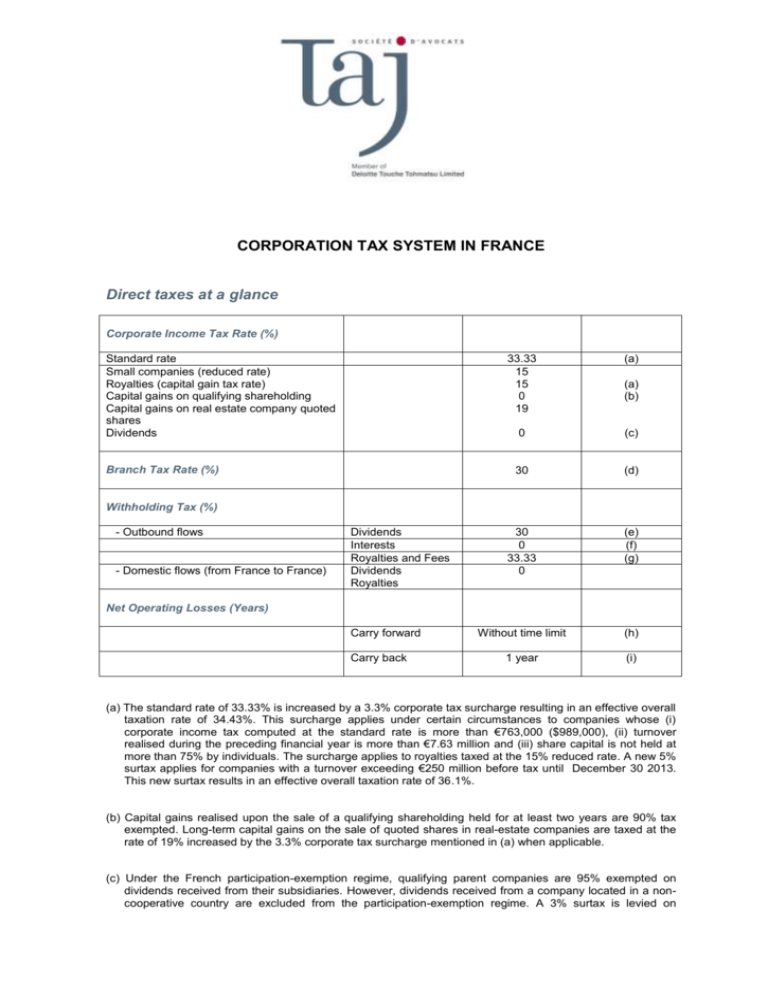
CORPORATION TAX SYSTEM IN FRANCE
Direct taxes at a glance
Corporate Income Tax Rate (%)
Standard rate
Small companies (reduced rate)
Royalties (capital gain tax rate)
Capital gains on qualifying shareholding
Capital gains on real estate company quoted
shares
Dividends
Branch Tax Rate (%)
33.33
15
15
0
19
(a)
0
(c)
30
(d)
30
0
33.33
0
(e)
(f)
(g)
Without time limit
(h)
1 year
(i)
(a)
(b)
Withholding Tax (%)
- Outbound flows
- Domestic flows (from France to France)
Dividends
Interests
Royalties and Fees
Dividends
Royalties
Net Operating Losses (Years)
Carry forward
Carry back
(a) The standard rate of 33.33% is increased by a 3.3% corporate tax surcharge resulting in an effective overall
taxation rate of 34.43%. This surcharge applies under certain circumstances to companies whose (i)
corporate income tax computed at the standard rate is more than €763,000 ($989,000), (ii) turnover
realised during the preceding financial year is more than €7.63 million and (iii) share capital is not held at
more than 75% by individuals. The surcharge applies to royalties taxed at the 15% reduced rate. A new 5%
surtax applies for companies with a turnover exceeding €250 million before tax until December 30 2013.
This new surtax results in an effective overall taxation rate of 36.1%.
(b) Capital gains realised upon the sale of a qualifying shareholding held for at least two years are 90% tax
exempted. Long-term capital gains on the sale of quoted shares in real-estate companies are taxed at the
rate of 19% increased by the 3.3% corporate tax surcharge mentioned in (a) when applicable.
(c) Under the French participation-exemption regime, qualifying parent companies are 95% exempted on
dividends received from their subsidiaries. However, dividends received from a company located in a noncooperative country are excluded from the participation-exemption regime. A 3% surtax is levied on
dividend distributions and deemed dividends paid by French entities subject to corporate income tax. This
surtax applies to distributions made from August 17 2012.
(d) Branch tax does not apply to French branches of companies having their effective place of management
within the EU and subject there to corporate income tax.
(e) This domestic withholding tax is reduced or even cancelled by relevant tax treaties provisions (France has
concluded 124 double tax treaties). In addition, assuming the conditions set up by the EU
Parent/Subsidiary Directive as implemented into French law are satisfied, no withholding tax applies (when
the French source dividends giving rise to the withholding tax are paid to a company having its effective
place of management within the EU where it is subject to corporate income tax and provided certain
conditions are met).
A 55% withholding tax may also be applicable when the dividends are paid to a resident of a non
cooperative jurisdiction.
(f) No withholding applies, except on interest paid to resident of a non-cooperative jurisdiction. In this case, the
withholding tax is applied at a 50% rate.
(g) This domestic withholding tax can be reduced or even cancelled by relevant tax treaty provisions. Besides,
when conditions for the application of the Interest and Royalties Directive (implemented into French
domestic law) are satisfied, no tax is withheld.
A withholding tax at a 50% rate is applied on royalties paid to resident of a non-cooperative jurisdiction.
(h) Ordinary losses generally may be carried forward indefinitely, but may be offset against taxable profit of a
given year only up to an amount equal to €1 million, plus 60% of the taxable result more than the €1 million
threshold for the fiscal year considered.
(i) Losses also may be carried one year back but only up to an amount of €1 million, under certain conditions.
-2The information contained herein is for general purposes only and is not intended, and should not be construed, as legal or tax advice, or
opinion provided by Taj to the reader. This material may not be applicable to, or suitable for, the reader’s specific circumstances or needs.
Therefore, the information should not be used as a substitute for consultation with professional tax, legal or other competent advisers. Please
contact your local Taj professional before taking any action based upon this information. Copyright 2012 Taj. All rights reserved.
Indirect taxes at a glance
VAT (Value Added tax) (%)
(j)
Standard rate
Reduced rates
Special rate
Local economic contribution
(contribution économique
territoriale - CET)
19.6
7 and 5.5
2.1
Applicable rates are voted by
local communities
(k)
(%)
Payroll taxes (%)
Apprenticeship tax
Salary tax
0.5 / 0.26 (l)
4.25/8.5/13.60(m)
Registration duties
See note (n)
(j) VAT is a consumption tax which is applied at each stage in the production process but does not represent a
final liability for most companies (except those of the banking sector) as they are usually able to recover it.
There are four VAT rates in France: a standard rate of 19.6%, two reduced rates of 5.5% and 7% that apply
to basic necessities and one super-reduced rate of 2.1%. Certain transactions are exempt or zero-rated.
(k) Local economic contribution (contribution économique territoriale - CET)
Local economic contribution (contribution économique territoriale or CET), is made up of two
separate components: the corporate property contribution (cotisation foncière des entreprises or
CFE) and the contribution on added value (cotisation sur la valeur ajoutée des entreprises or
CVAE).
The CET (CFE and CVAE) is capped at 3% of the company’s added value.
The assessed added value is itself capped, depending on the case, at 80% or 85% of turnover
(depending on whether the company’s turnover is below or above € 7.6 million).
The corporate property contribution (CFE) is assessed annually by the local authorities that set
the CFE tax rate for businesses located in their area.
The tax base is constituted by fixed assets subject to the corporate property contribution that the
company owned at the end of the penultimate calendar year before the tax year (N-2).
It is equivalent to the land registry rental value (flat rate of 8%) of fixed assets subject to the
corporate property contribution (specifically, buildings and land made available for professional
purposes) with a 30% deduction for industrial businesses.
The contribution on added value of businesses (CVAE) is assessed on the added value
companies realised during the previous calendar year or the last 12-month financial year if this
does not coincide with the calendar year.
Only companies with annual pre-tax turnover of more than €500,000 must pay the CVAE. The
CVAE rate is 1.5% for companies with an annual pre-tax turnover of more than €50 million.
Below this amount, companies are subject to a reduced CVAE rate (variable depending on
turnover).
Where companies are members of a fiscal unity, the turnover taken into account to appreciate
whether a member company is liable for CVAE is the overall turnover of the fiscal unity.
-3The information contained herein is for general purposes only and is not intended, and should not be construed, as legal or tax advice, or
opinion provided by Taj to the reader. This material may not be applicable to, or suitable for, the reader’s specific circumstances or needs.
Therefore, the information should not be used as a substitute for consultation with professional tax, legal or other competent advisers. Please
contact your local Taj professional before taking any action based upon this information. Copyright 2012 Taj. All rights reserved.
(l) The apprenticeship tax is levied on the amount of salaries and wages paid. The standard rate of the
apprenticeship tax is 0.5%, but 0.26% for companies in Alsace-Moselle. The apprenticeship tax is
deductible for corporate income tax purposes.
(m) Companies not subject to value-added tax (VAT) or with a turnover at least 90% exempt from VAT in the
preceding year must pay a salary tax assessed on the salaries and wages paid. The salary tax affects
mainly the banking and insurance sectors. The rates are 4.25% on individual salaries up to €7,604, 8.5%
on the portion of the salary between €7,604 and €15,185 and 13.6% on the portion more than €15,185. The
salary tax is deductible for corporate income tax purposes.
(n) There are many operations that are subject to registration duties:
From August 1 2012, the progressive rate of transfer tax applicable on the sale of shares of an SA, SAS or
SCA is replaced by a flat rate of 0.1%. Previously, the rates were 3% on the part of the sale price below
€200,000; 0.5% on the part between €200,000 and €500 million; and 0.25% on the part more than €500
million.
Where the units of an entity other than an SA, SAS or SCA are sold, the stamp duty applicable is
equivalent to 3% of the purchase price minus a sum equal to the number of units sold x €23,000/total
number of the company units.
Where the shares or the units of a real estate company are sold, a 5% stamp duty applies. A company is
considered to be a real estate company if real estate comprises more than 50% of its assets.
A registration duty also applies to a sale of a business as an on-going concern equal to 3% for the fraction
of the price ranging from €23,000 to €200,000 and 5% for the fraction which is more than €200,000. The
fraction below €23,000 is exempt from registration duty.
-4The information contained herein is for general purposes only and is not intended, and should not be construed, as legal or tax advice, or
opinion provided by Taj to the reader. This material may not be applicable to, or suitable for, the reader’s specific circumstances or needs.
Therefore, the information should not be used as a substitute for consultation with professional tax, legal or other competent advisers. Please
contact your local Taj professional before taking any action based upon this information. Copyright 2012 Taj. All rights reserved.
Outline of French corporate tax system
Territoriality principle
France has a territorial system of corporate income taxation. Accordingly, French companies and French
branches of foreign companies are subject to corporate income tax for profits derived from businesses run in
France, that is, companies, wherever resident, are only subject to corporate income tax on income derived
from French source. Consequently, losses incurred outside France cannot be taken into consideration in
determining the French taxable result.
However, as from financial years opening on or after January 1 2009, small and medium sized enterprises may
temporarily take into account losses incurred by their foreign branches and subsidiaries in determining taxable
income in France. The losses will be recaptured once the foreign entity returns to profitability or, at the latest, in
the fifth fiscal year after the offset.
Taxable income
The computation of taxable income is made on the basis of the local statutory accounts, adjusted according to
the provisions of the French tax code. Allowable expenses are those whose reality can be evidenced and that
were incurred for the purpose of the business.
Taxable year
A company’s fiscal year is its financial year. It is freely determined by each company. Most companies have a
fiscal year which corresponds to the calendar year (January 1 – December 31). Corporate income tax is paid in
four instalments and one final payment. The instalments are due on March 15, June 15, September 15 and
December 15. They are calculated as 8.33% of the taxable profit of the prior year. The final payment of tax is
due with the self assessment tax return, within three and a half months of the end of the tax year.
Participation-exemption regime
Under the participation-exemption regime, qualifying parent companies subject to French corporate income
tax, at the full standard rate on all or part of their business activities, can elect for a 95% exemption on
dividends received from their subsidiaries, the remaining 5% are deemed to correspond to a “management
charge”. This 5% amount is fixed: companies will have to pay it even if the actual charges appear to be
eventually lower. Hence, the effective rate of taxation is 1.72% (that is, 5% of 34.43%). The threshold of
participation is 5% of the voting and financial rights which must have been held for at least two years.
The revised budget law for 2012 introduced a surtax on corporate dividends. This 3% surtax is levied on
dividend distributions and deemed dividends paid by French entities subject to corporate income tax.
Dividends paid by collective investment funds, such as SICAVs, fall outside the scope of the new surtax, but
profits of permanent establishments of foreign entities are subject to the tax. The revised budget, however,
does provide specific exemptions from the surtax for dividends paid between members of a French tax
consolidated group, dividends paid by small and medium-sized enterprises, and dividends paid by their
qualifying subsidiaries to SIICs and SPPICAVs (that is, real estate funds).
Capital gains on qualifying shareholding held for at least two years are 90% exempt (that is, the effective rate
of taxation is 3.44%).
Interest paid to related parties
To be tax deductible, interest paid to related companies (or to third parties for loans secured by a related
company) should be a market rate. In addition, financial charges are not tax deductible if they simultaneously
are more than these three ratio/thresholds (thin-capitalisation rules):
1.5:1 related-party debt-to-equity ratio;
25% of pre-tax adjusted operating profits (that is, profits before tax, intra-group interest, amortisation and
certain specific lease payments); and
Interest received from related parties (if the company uses the funds to finance other affiliated companies).
Unless the company can demonstrate that its own total debt-to-share capital ratio is not more than the
worldwide group’s third-party debt-to-share capital ratio, interest is deductible up to the amount corresponding
to the highest of the above ratio/thresholds. However, the interest deduction is only disallowed to the extent the
interest is more than €150,000. The non-deductible amount can be carried forward reduced by 5% a year (the
reduction starts to apply as of the second year in which the excess is carried forward).
-5The information contained herein is for general purposes only and is not intended, and should not be construed, as legal or tax advice, or
opinion provided by Taj to the reader. This material may not be applicable to, or suitable for, the reader’s specific circumstances or needs.
Therefore, the information should not be used as a substitute for consultation with professional tax, legal or other competent advisers. Please
contact your local Taj professional before taking any action based upon this information. Copyright 2012 Taj. All rights reserved.
Tax consolidation regime
The French Tax Code contains an optional tax consolidation regime, whereby French group companies may
file a consolidated return. Under this regime, profits and losses incurred by the individual group are aggregated
to determine a tax consolidated result (intra-group transactions are neutralised). To qualify for consolidation the
head of group must be a French company that is not itself 95% or more held by another French company
subject to corporate income tax. The other members must be subject to French corporate income tax. The
French parent must hold at least 95% in the share capital of the subsidiary, either directly or indirectly through
other companies that are members of the same tax consolidated group. A French company which is indirectly
held for more than 95% by another French company via a foreign company located in the EU, Norway or
Iceland can be part of the French consolidation regime.
Research tax credit
A company may claim a tax credit of 30% of research expenses incurred up to €100 million; the rate is reduced
to 5% for the surplus. For expenses incurred from January 1 2011, this tax credit is increased to 40% (35% in
the second year) when a company incurs R&D expenses for the first time or has not benefited from the R&D
tax credit for more than five years. The tax credit is deductible from corporate income tax for that year and the
following three years. Any credit remaining after this period is reimbursed immediately for new businesses
during the first five years, and after five years for others.
Listed real-estate investment companies (Sociétés d’Investissements Immobiliers Cotées)
Listed real-estate companies (SIIC or REIT) are entitled to an exemption from corporate income tax on rental
income and capital gains subject to distribution duties. A real-estate company may elect for this regime
provided it is listed on a French stock exchange or on a foreign stock exchange (under conditions, applicable
since January 1 2010), it has a minimum share capital of €15 million and the main business purpose of the
company is the acquisition or construction of real estate for rental purposes, and/or direct or indirect
shareholdings in entities (either corporate or pass-through entities) that have a similar business purpose.
Subsidiaries that are at least 95% directly or indirectly owned by a REIT, or that are jointly owned for more than
95% by a REIT and a real estate company with variable capital (Sppicav), and that have a similar business
purpose and are subject to tax may also elect to be subject to the regime.
Anti-avoidance legislation
General anti-avoidance provisions exist to prevent the abuse of legislation or artificial transactions being
undertaken for the purpose of avoiding tax. A general anti-abuse rule provides that any agreement or operation
exclusively aimed at tax mitigation and undertaken contrary to the intention of the legislature, that is, that
cannot be justified by economic or other reasons can be disregarded. In addition, an 80% penalty may apply.
The burden of proof belongs to the tax authorities and the case law is restrictive in admitting an abuse of tax
law/fraud to tax law.
Tax haven rules
A tax haven in France is defined as a system in which the taxpayer is subject to income taxes where the
amount is 50% lower than the income tax that would have been due in France if the taxpayer had been tax
resident in France. Payments made to individual or legal entities domiciled or established in a low tax
jurisdiction cannot be deducted by the French taxpayer. However, a tax deduction is allowed if these expenses
correspond to real transactions and where the amount involved is neither outside the company’s business
interest nor exaggerated. In addition, if the beneficiary of the payments is domiciled or established in a noncooperative state or territory, the French taxpayer should demonstrate that the operations to which the
expenses correspond are not motivated by tax considerations (that is, the localisation of such expenses in a
non-cooperative state or territory). Interest paid for loans contracted before March 1 2010 are not concerned by
this additional limitation.
Controlled foreign companies
Controlled foreign company (CFC) rules apply to resident companies that directly or indirectly hold a
participation of more than 50% in a foreign legal entity or PE set up in a country of which effective taxation is at
least 50% lower than that of France. Companies subject to CFC legislation are assessed to tax in France on a
pro rata amount of the income received, or deemed received, from such entity or PE. An anti-abuse provision
reduces the participation threshold to 5% in situations where more than 50% of the shares in the foreign entity
are owned by French companies or by foreign entities directly or indirectly controlled by a French company.
Controlled foreign company rules may be avoided when the CFC is located within the EU, unless the French
shareholding in the CFC is deemed to be a wholly artificial arrangement intended to avoid the French tax
legislation.
-6The information contained herein is for general purposes only and is not intended, and should not be construed, as legal or tax advice, or
opinion provided by Taj to the reader. This material may not be applicable to, or suitable for, the reader’s specific circumstances or needs.
Therefore, the information should not be used as a substitute for consultation with professional tax, legal or other competent advisers. Please
contact your local Taj professional before taking any action based upon this information. Copyright 2012 Taj. All rights reserved.
If the CFC is located outside the EU and engaged in genuine economic activities in its State of residence,
French CFC rules will not apply. When its passive income represents a significant share of its profits, the
French CFC rules will be applicable, except if the French company can prove that the location of the CFC is
not solely based on tax consideration.
For fiscal years ending on or after December 31 2012, the French entity will now have to demonstrate that the
main purpose and effect of the operations of its foreign (non-EU) CFC is non-tax driven to avoid the application
of the CFC rules (that is, the burden of proof is reversed). The passive income percentages applying under the
existing rules will no longer be needed and, hence, will be eliminated.
Mergers & acquisitions
Favourable tax treatment (so-called “merger relief”), is available for mergers if certain conditions are met either
when one company absorbs another or when a new company is constituted to absorb one or more existing
companies. Some types of mergers involving foreign companies require prior approval from the French tax
authorities.
Other significant issues
France is one of the founding member States of the European Union (Treaty of Rome 1957).
France has entered into a significant number of double tax treaties ( 120 in-force as of January 1 2011).
-7The information contained herein is for general purposes only and is not intended, and should not be construed, as legal or tax advice, or
opinion provided by Taj to the reader. This material may not be applicable to, or suitable for, the reader’s specific circumstances or needs.
Therefore, the information should not be used as a substitute for consultation with professional tax, legal or other competent advisers. Please
contact your local Taj professional before taking any action based upon this information. Copyright 2012 Taj. All rights reserved.
Contact
Ambroise Bricet
Tax Partner
Abricet@taj.fr
Our offices in France
Neuilly-sur-Seine
181, avenue Charles de Gaulle
92524 Neuilly-sur-Seine cedex
France
Tel.: +33 1 40 88 22 50
Fax : +33 1 40 88 22 17
Lyon
Immeuble « Park avenue »
81, boulevard de Stalingrad
BP 41262
69608 Villeurbanne cedex
France
Tel.: +33 4 72 43 37 85
Fax : +33 4 72 43 39 94
Bordeaux
19 boulevard Alfred Daney
BP 80105
33041 Bordeaux Cedex
France
Tel.: +33 5 57 19 51 00
Fax : +33 5 57 19 51 01
Marseille
Les Docks – Atrium 10.4
10, place de la Joliette
BP 62544
13567 Marseille cedex 02
France
Tel.:+33 4 91 59 84 75
Fax :+33 4 91 59 84 79
Lille
83, rue de Luxembourg
59777 Euralille
France
Tel.: +33 3 20 14 94 20
Fax : +33 3 20 14 94 29
Tours
19, rue Edouard Vaillant
BP 4314
37043 Tours cedex 1
France
Tel.: +33 2 47 60 88 40
Fax : +33 2 47 60 88 41
Perpignan
27 rue Mailly
66000 Perpignan
Tel.: 04 68 87 30 69
About Taj
Taj is one of the leading French legal firms, specialized in international tax and legal strategies. It currently boasts 400
professionals, including 47 partners, based in Paris, Lyon, Marseille, Tours, Bordeaux and Lille. Its highly recognized
expertise covers in particular international taxation and transfer pricing, mergers and acquisitions, indirect taxation, tax
controversy, international mobility taxation, labor law, business law and companies in financial distress.
Taj is member of Deloitte Touche Tohmatsu Limited and as a result is able to call on the worldwide expertise of 25 000
Deloitte professionals.
For more information, please visit www.taj.fr and www.taj-strategie.fr
About Deloitte
Deloitte refers to one or more of Deloitte Touche Tohmatsu Limited, a UK private company limited by guarantee, and its
network of member firms, each of which is a legally separate and independent entity. Please see www.deloitte.com/about for
a detailed description of the legal structure of Deloitte Touche Tohmatsu Limited and its member firms. In France, Deloitte
-8The information contained herein is for general purposes only and is not intended, and should not be construed, as legal or tax advice, or
opinion provided by Taj to the reader. This material may not be applicable to, or suitable for, the reader’s specific circumstances or needs.
Therefore, the information should not be used as a substitute for consultation with professional tax, legal or other competent advisers. Please
contact your local Taj professional before taking any action based upon this information. Copyright 2012 Taj. All rights reserved.
SA is the member firm of Deloitte Touche Tohmatsu Limited, and professional services are provided by its subsidiaries and
affiliates.
9
The information contained herein is for general purposes only and is not intended, and should not be construed, as legal or tax advice, or
opinion provided by Taj to the reader. This material may not be applicable to, or suitable for, the reader’s specific circumstances or needs.
Therefore, the information should not be used as a substitute for consultation with professional tax, legal or other competent advisers. Please
contact your local Taj professional before taking any action based upon this information. Copyright 2012 Taj. All rights reserved.









